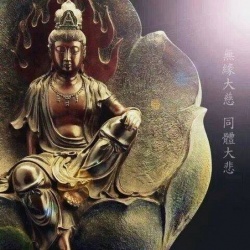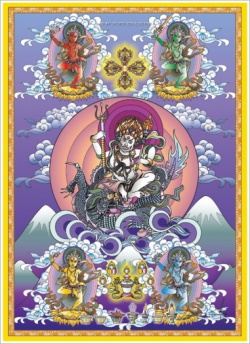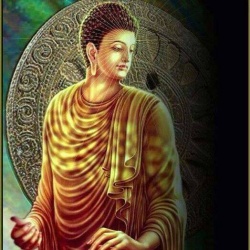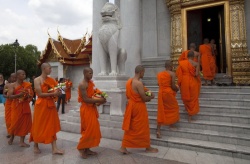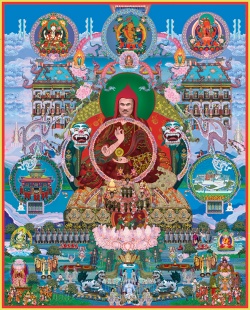Difference between revisions of "The Great Chariot"
(Created page with " The Great Chariot A Commentary on Great Perfection: The Nature of Mind, Easer of Weariness first previous index next last Contents / The Homage and...") |
|||
| (3 intermediate revisions by the same user not shown) | |||
| Line 1: | Line 1: | ||
| − | + | <nomobile>{{DisplayImages|3983|1624|3642|2523|3250|1795}}</nomobile> | |
| + | <poem> | ||
The [[Great Chariot]] | The [[Great Chariot]] | ||
A Commentary on [[Great Perfection]]: The [[Nature of Mind]], Easer of Weariness | A Commentary on [[Great Perfection]]: The [[Nature of Mind]], Easer of Weariness | ||
| − | |||
| − | |||
/ The Homage and the [[Vow]] to Compose | / The Homage and the [[Vow]] to Compose | ||
| Line 20: | Line 19: | ||
The [[Buddha]] came into this [[world]]. The {{Wiki|excellent}} {{Wiki|speech}} of his teachings, the {{Wiki|holy}} [[Dharma]], remains in [[existence]] by the [[kindness]] of [[Wikipedia:Authenticity|authentic]] great [[beings]]. | The [[Buddha]] came into this [[world]]. The {{Wiki|excellent}} {{Wiki|speech}} of his teachings, the {{Wiki|holy}} [[Dharma]], remains in [[existence]] by the [[kindness]] of [[Wikipedia:Authenticity|authentic]] great [[beings]]. | ||
| − | At this time the freedoms and good favors, so difficult to achieve, have been [[attained]]. Therefore, I wished to compose the thirteen chapters of this treatise, the [[Great Perfection]]: The [[Nature of Mind]], Easer of Weariness so that its readers themselves and others could cross completely the ocean of [[sufferings]] of [[samsara]]. This treatise teaches the complete meaning of all the vehicles and makes it possible for [[mind]], grown weary in [[samsara]], to ease that weariness in the [[land of peace]]. I also wished to teach fully and without error the details of how the ocean of approaches of [[sutra]] and [[mantra]] could be practiced by a single {{Wiki|individual}}, from how the beginner enters and begins, up the [[fruition]], the [[manifestation]] of [[buddhahood]]. Therefore, first I [[offered]] a short homage: | + | At this time the freedoms and good favors, so difficult to achieve, have been [[attained]]. |
| + | |||
| + | Therefore, I wished to compose the thirteen chapters of this treatise, the [[Great Perfection]]: | ||
| + | |||
| + | The [[Nature of Mind]], Easer of Weariness so that its readers themselves and others could cross completely the ocean of [[sufferings]] of [[samsara]]. This treatise teaches the complete meaning of all the vehicles and makes it possible for [[mind]], grown weary in [[samsara]], to ease that weariness in the [[land of peace]]. | ||
| + | |||
| + | I also wished to teach fully and without error the details of how the ocean of approaches of [[sutra]] and [[mantra]] could be practiced by a single {{Wiki|individual}}, from how the beginner enters and begins, up the [[fruition]], the [[manifestation]] of [[buddhahood]]. Therefore, first I [[offered]] a short homage: | ||
| + | |||
The [[primordial]] lord, the great, full ocean of [[buddha]] qualities, | The [[primordial]] lord, the great, full ocean of [[buddha]] qualities, | ||
| Line 28: | Line 34: | ||
Of these heaped up clouds of [[goodness]] and of [[benefit]]. | Of these heaped up clouds of [[goodness]] and of [[benefit]]. | ||
| − | |||
| − | By earnestly practicing the [[Dharma]] [[taught]] here, [[mind]] becomes the source of the [[jewel]][2] of the [[buddhas of the three times]] and their sons. As well, for all the [[realms]] of [[sentient beings]], as {{Wiki|limitless}} as the sky, there are {{Wiki|temporal}} benefits in accord with the [[happiness]] of each. [[Gods]] and [[human beings]] alike are brought to [[happiness]]. | + | Thus I call on him. This “lord” is the [[manifestation]] of [[enlightenment]], whose place is the [[primordial ground]]. |
| + | |||
| + | He is the [[teacher]], the [[Buddha]], the [[Blessed One]]. | ||
| + | |||
| + | His [[nature]] is the great full ocean of qualities of [[renunciation]] and [[realization]]; thus, he {{Wiki|rules}} the [[sphere]] of the inexhaustible ornaments,[1] [[body]], {{Wiki|speech}}, and [[mind]]. | ||
| + | |||
| + | All the depth and expanse of supreme [[understanding]] and wondrously arisen [[compassion]] are just this. | ||
| + | |||
| + | To the [[mind]] that sees only the [[manifestations]] of the I of “this side,” this is incomprehensible. | ||
| + | |||
| + | |||
| + | By earnestly practicing the [[Dharma]] [[taught]] here, [[mind]] becomes the source of the [[jewel]][2] of the [[buddhas of the three times]] and their sons. | ||
| + | |||
| + | As well, for all the [[realms]] of [[sentient beings]], as {{Wiki|limitless}} as the sky, there are {{Wiki|temporal}} benefits in accord with the [[happiness]] of each. [[Gods]] and [[human beings]] alike are brought to [[happiness]]. | ||
| + | |||
| + | |||
| + | {{Wiki|Ultimate}} [[happiness]] is to be established in whichever of the [[three enlightenments]] of the [[shravakas]], [[pratyekabuddhas]], and [[bodhisattvas]] is in accord with the [[degree]] of [[good fortune]] of our [[powers]]. | ||
| + | |||
| + | The {{Wiki|holy}} [[masters]] so unite us with supremely [[Wikipedia:Absolute (philosophy)|ultimate]] great [[enlightenment]], [[omniscient]] [[buddhahood]]. | ||
| + | |||
| + | Therefore, I [[prostrate]] to them, glorious [[Samantabhadra]] and so forth, the [[victorious ones]] and their sons throughout the [[ten directions]] and the three times. | ||
| − | |||
As for “the ocean of [[buddha]] qualities” of this [[primordial]] lord, the glorious Net of [[Illusion]] ([[Mayajala]]) says: | As for “the ocean of [[buddha]] qualities” of this [[primordial]] lord, the glorious Net of [[Illusion]] ([[Mayajala]]) says: | ||
| + | |||
This lord is {{Wiki|perfect}} [[primordial]] [[buddhahood]]. | This lord is {{Wiki|perfect}} [[primordial]] [[buddhahood]]. | ||
This is the [[precious]] ocean of [[buddha]] qualities. | This is the [[precious]] ocean of [[buddha]] qualities. | ||
| + | |||
[[Wisdom]], within whch [[understanding]] and [[kindness]] are entirely {{Wiki|perfect}} is nothing other than [[buddhahood]] [[Aryadeva’s]] Four Hundred Verse Treatise[3](Catuh.-shataka, [[bzhi brgya pa]]) says: | [[Wisdom]], within whch [[understanding]] and [[kindness]] are entirely {{Wiki|perfect}} is nothing other than [[buddhahood]] [[Aryadeva’s]] Four Hundred Verse Treatise[3](Catuh.-shataka, [[bzhi brgya pa]]) says: | ||
| + | |||
Things other than the [[Sage]], in their [[reality]], | Things other than the [[Sage]], in their [[reality]], | ||
[[Exist]] as nothing other than the [[Tathagata]]. | [[Exist]] as nothing other than the [[Tathagata]]. | ||
| + | |||
The above[4] three [[precious]] [[jewels]] also[5] arise within the connections of [[cause and effect]]. The | The above[4] three [[precious]] [[jewels]] also[5] arise within the connections of [[cause and effect]]. The | ||
| + | |||
Peerless Continūm ([[Uttaratantra]]) says: | Peerless Continūm ([[Uttaratantra]]) says: | ||
| + | |||
From the [[Buddha]] comes the [[Dharma]]; from the [[Dharma]] comes the assembly of [[noble ones]].[6] | From the [[Buddha]] comes the [[Dharma]]; from the [[Dharma]] comes the assembly of [[noble ones]].[6] | ||
| + | |||
With regard to [[emanating]] “heaped up clouds of [[goodness]] and [[benefit]]” for [[sentient beings]], the | With regard to [[emanating]] “heaped up clouds of [[goodness]] and [[benefit]]” for [[sentient beings]], the | ||
| + | |||
[[Ornament of Mahayana Sutras]] ([[Mahayanasutralamkara]], [[theg pa]] [[chen]] po’i [[mdo sde rgyan]]) says: | [[Ornament of Mahayana Sutras]] ([[Mahayanasutralamkara]], [[theg pa]] [[chen]] po’i [[mdo sde rgyan]]) says: | ||
| + | |||
They have [[compassionate]] [[kindness]] for every [[sentient being]]. | They have [[compassionate]] [[kindness]] for every [[sentient being]]. | ||
| Line 59: | Line 92: | ||
I [[prostrate]] to you so concerned with [[goodness]] and [[happiness]]. | I [[prostrate]] to you so concerned with [[goodness]] and [[happiness]]. | ||
| − | As for the {{Wiki|purpose}} of [[prostrating]] like that, from the great benefits [[attained]] by oneself, others and both together, as for the benefits [[attained]] by oneself, in this {{Wiki|excellent}} [[body]] [[attained]] by oneself for a little while, if the [[good fortune]] of being able to understand words and meaning* is praised, one realizes the [[excellence]] of that. Entering into {{Wiki|excellent}} [[activity]], we have the {{Wiki|purpose}} of finishing what was begun. In the [[Great Commentary]] on the [[Perfection of Wisdom]] in Eight Thousand Lines ([[brgyad stong]] [[don bsdus]]) it is written: | + | |
| + | As for the {{Wiki|purpose}} of [[prostrating]] like that, from the great benefits [[attained]] by oneself, others and both together, as for the benefits [[attained]] by oneself, in this {{Wiki|excellent}} [[body]] [[attained]] by oneself for a little while, if the [[good fortune]] of being able to understand words and meaning* is praised, one realizes the [[excellence]] of that. | ||
| + | |||
| + | Entering into {{Wiki|excellent}} [[activity]], we have the {{Wiki|purpose}} of finishing what was begun. In the [[Great Commentary]] on the [[Perfection of Wisdom]] in Eight Thousand Lines ([[brgyad stong]] [[don bsdus]]) it is written: | ||
| + | |||
Those who have the [[kindness]] of [[benefit]] for others, | Those who have the [[kindness]] of [[benefit]] for others, | ||
| Line 65: | Line 102: | ||
These [[holy beings]] are bearers of a heavy [[burden]], | These [[holy beings]] are bearers of a heavy [[burden]], | ||
But never dwell in discouragement and put it down. | But never dwell in discouragement and put it down. | ||
| + | |||
*= Our [[good fortune]] in being [[humans]] with the capacity for [[language]] who therefore can hear and practice the teachings, If "gyi" should be read as "gyis" or has the force of an instrumental the meaning would be praised with [[word]] and meaning. | *= Our [[good fortune]] in being [[humans]] with the capacity for [[language]] who therefore can hear and practice the teachings, If "gyi" should be read as "gyis" or has the force of an instrumental the meaning would be praised with [[word]] and meaning. | ||
| + | |||
The {{Wiki|purpose}} of these great benefits being [[attained]] by others as well is that when the [[teacher]] and teachings are understood as {{Wiki|excellent}}, [[devotion]] arises. [[Nagarjuna says]]: | The {{Wiki|purpose}} of these great benefits being [[attained]] by others as well is that when the [[teacher]] and teachings are understood as {{Wiki|excellent}}, [[devotion]] arises. [[Nagarjuna says]]: | ||
| + | |||
When authors of the treatises express their homage | When authors of the treatises express their homage | ||
| Line 74: | Line 114: | ||
That is done for the {{Wiki|purpose}} of inspiring us . | That is done for the {{Wiki|purpose}} of inspiring us . | ||
| − | The {{Wiki|purpose}} of [[attaining]] both kinds of [[benefit]], those for oneself and for others, is that by perfecting the [[accumulations]], the goal of ripening will be accomplished. The [[Sutra | + | |
| + | The {{Wiki|purpose}} of [[attaining]] both kinds of [[benefit]], those for oneself and for others, is that by perfecting the [[accumulations]], the goal of ripening will be accomplished. The [[Sutra of Vast Play]], ([[Lalita- vistara-sutra]]) says: | ||
| + | |||
The wishes of those with [[merit]] will be accomplished. | The wishes of those with [[merit]] will be accomplished. | ||
| − | And from the [[Sutra | + | And from the [[Sutra Producing Many Buddhas]] ([[sangs rgyas mang byed pa’i mdo]]): |
Whoever does even a little bit of [[activity]] | Whoever does even a little bit of [[activity]] | ||
| Line 96: | Line 138: | ||
Today may our weariness come to rest in that [[nature of mind]]. | Today may our weariness come to rest in that [[nature of mind]]. | ||
| − | [[Mind]] itself is [[primordial]] [[luminosity]], the [[essence of buddha]] [[nature]]. It is beyond the [[four extremes]] of [[existence]], [[non-existence]], {{Wiki|eternalism}}, and [[nihilism]]. It pervades all [[sentient beings]] from the beginning. The Peerless Continūm says: | + | |
| + | [[Mind]] itself is [[primordial]] [[luminosity]], the [[essence of buddha]] [[nature]]. | ||
| + | |||
| + | It is beyond the [[four extremes]] of [[existence]], [[non-existence]], {{Wiki|eternalism}}, and [[nihilism]]. | ||
| + | |||
| + | It pervades all [[sentient beings]] from the beginning. The Peerless Continūm says: | ||
| + | |||
When in the [[luminous nature of the mind]] | When in the [[luminous nature of the mind]] | ||
| Line 111: | Line 159: | ||
*= Pristine apprehension, [[ye shes]]. | *= Pristine apprehension, [[ye shes]]. | ||
| − | Although that [[primordially pure]] [[pristine wisdom]] [[exists]] within us, by not [[recognizing]] it, we wander here in [[samsara]]. [[Ignorance]] that produces ego-grasping is [[karma]]. [[Karma]] produces [[passion]], [[aggression]], [[ignorance]], [[pride]], and [[envy]]. Because of these [[five poisons]], or [[kleshas]], we are whirling around in [[cyclic existence]]. | + | Although that [[primordially pure]] [[pristine wisdom]] [[exists]] within us, by not [[recognizing]] it, we wander here in [[samsara]]. [[Ignorance]] that produces ego-grasping is [[karma]]. |
| + | |||
| + | [[Karma]] produces [[passion]], [[aggression]], [[ignorance]], [[pride]], and [[envy]]. | ||
| + | |||
| + | Because of these [[five poisons]], or [[kleshas]], we are whirling around in [[cyclic existence]]. | ||
| + | |||
| + | |||
| + | Why is this so? Because of various [[habitual patterns]] being {{Wiki|superimposed}} on the ground-of-all ([[alaya]]), the least negative result is that we are born as [[animals]] by the [[karma]] of [[ignorance]]. | ||
| + | |||
| + | The [[intermediate]] negative result is that we are born as [[hungry ghosts]] or [[pretas]] by the [[karma]] of [[passion]]. | ||
| + | |||
| + | And the worst result is that we are born in the [[hell realms]] by the [[karma]] of agression. | ||
| − | + | Those who have [[pure]] [[merit]], but also an {{Wiki|equal}} amount of [[pride]], are born as [[gods]] or [[human beings]]. | |
| − | + | Those who have {{Wiki|equal}} parts of [[goodness]] and [[jealousy]] are born as [[jealous]] [[gods]], [[asuras]]. | |
| − | So it is that we wander helplessly on this plain of [[beginningless]] and [[endless]] [[sufferings]] of [[samsara]], so difficult to cross. In vanity we [[grasp]] at [[appearances]] of an I, a real [[self]], which are like the seeming [[appearances]] of a [[dream]]. Though if we examine these well, they are [[non-existent]]; at this time of our [[confusion]] they appear to be really and [[truly existent]]. From the [[King of Samadhi Sutra]] ([[Samadhi | + | Each of these is its [[own]] [[realm of existence]], with [[happiness]], [[sorrow]], and the states between them. |
| + | |||
| + | Each [[realm]] has its [[own]] sorts of [[good and evil]] {{Wiki|behavior}}. | ||
| + | |||
| + | |||
| + | So it is that we wander helplessly on this plain of [[beginningless]] and [[endless]] [[sufferings]] of [[samsara]], so difficult to cross. | ||
| + | |||
| + | In vanity we [[grasp]] at [[appearances]] of an I, a real [[self]], which are like the seeming [[appearances]] of a [[dream]]. Though if we examine these well, they are [[non-existent]]; | ||
| + | |||
| + | at this time of our [[confusion]] they appear to be really and [[truly existent]]. | ||
| + | |||
| + | From the [[King of Samadhi Sutra]] ([[Samadhi- raja-sutra]], [[ting nge ‘dzin rgyal po’i m): | ||
The [[life]] of [[samsaric]] [[beings]] is like a [[life]] in a [[dream]]. | The [[life]] of [[samsaric]] [[beings]] is like a [[life]] in a [[dream]]. | ||
Therefore, no one is ever born or ever [[dies]]. | Therefore, no one is ever born or ever [[dies]]. | ||
| − | The [[Sutra | + | |
| + | The [[Sutra Requested by Brahma]] ([[Bhrama-paripriccha-sutra]], [[tshangs pa las zus pa’i mdo]]) says: | ||
| + | |||
[[Beings]] are mere [[appearance]], like [[beings]] in a [[dream]], | [[Beings]] are mere [[appearance]], like [[beings]] in a [[dream]], | ||
| Line 131: | Line 203: | ||
And so [[samsara’s]] torments rise ever higher and higher. | And so [[samsara’s]] torments rise ever higher and higher. | ||
| − | |||
| − | Why? When they understand [[selflessness]] as the very [[nature]] of their [[path]], it follows that it is wrong for them to devote themselves to the [[selfish]] goal of [[peace]] for themselves alone. As all [[beings]] wander in [[beginningless]] [[samsara]], not even one has not been our father or our mother. So to reject them and {{Wiki|liberate}} ourselves alone is not the right way. The [[Letter]] to a [[Student]] ([[Wikipedia:guru-shishya tradition|shishya]] [[lekha]], slob spring) says: | + | Thus [[sentient beings]] in [[samsara]] are held in their various kinds of bondage. |
| + | |||
| + | All [[dharmas]] are [[selfless]], and, to open the [[eyes]] of [[liberation]] for those who fixate on a [[self]], such [[beings]] must be [[taught]] the [[selfless]] [[essence]] of the true meaning. | ||
| + | |||
| + | Why? When they understand [[selflessness]] as the very [[nature]] of their [[path]], it follows that it is wrong for them to devote themselves to the [[selfish]] goal of [[peace]] for themselves alone. | ||
| + | |||
| + | As all [[beings]] wander in [[beginningless]] [[samsara]], not even one has not been our father or our mother. | ||
| + | |||
| + | So to reject them and {{Wiki|liberate}} ourselves alone is not the right way. | ||
| + | |||
| + | The [[Letter]] to a [[Student]] ([[Wikipedia:guru-shishya tradition|shishya]] [[lekha]], slob spring) says: | ||
| + | |||
Our [[family]] is engulfed in the ocean of [[samsara]]. | Our [[family]] is engulfed in the ocean of [[samsara]]. | ||
| Line 146: | Line 228: | ||
Who, even the very base, would want to abandon them? | Who, even the very base, would want to abandon them? | ||
| − | |||
| − | Kye! Son of [[noble]] [[family]], when we properly focus our [[attention]] on the [[realms]] of [[sentient beings]], all undertakings of [[body]], {{Wiki|speech}}, and [[mind]] truly guide those roaming in [[samsara]]. Therefore these undertakings are [[immeasurable]] [[great compassion]]. We work with the [[activities]] of {{Wiki|sciences}} both [[worldly]] and beyond the [[world]]. Inspired to the good, we perform once more the [[buddha activity]] of the former [[victorious ones]]. Doing that is making [[offerings]] to the [[Tathagatas]]. Let us raise the [[victory banner]] of [[Dharma]]. Let us introduce the great [[path of liberation]]. O [[holy beings]]! O [[precious]] {{Wiki|crown}} ornaments! | + | [[Thinking]] of this and [[seeing]] the weariness of [[sentient beings]], who are worn out and exhausted by the [[burden]] of their long wandering in [[samsara]], I wished to compose a treatise giving instructions for how we can ease this weariness by coming to the resting place adorned by the wondrous [[wealth]] of the [[victorious ones]], the level of great [[nirvana]]. |
| + | |||
| + | I wished to [[illuminate]] how we can guide those who wander in [[samsara]] with immeasurably [[abundant]] [[compassion]]. | ||
| + | |||
| + | [[The Flower Ornament Sutra]] ([[Avatamsaka-sutra]], [[mdo phal po che]]) says: | ||
| + | |||
| + | |||
| + | Kye! Son of [[noble]] [[family]], when we properly focus our [[attention]] on the [[realms]] of [[sentient beings]], all undertakings of [[body]], {{Wiki|speech}}, and [[mind]] truly guide those roaming in [[samsara]]. | ||
| + | |||
| + | Therefore these undertakings are [[immeasurable]] [[great compassion]]. | ||
| + | |||
| + | We work with the [[activities]] of {{Wiki|sciences}} both [[worldly]] and beyond the [[world]]. | ||
| + | |||
| + | Inspired to the good, we perform once more the [[buddha activity]] of the former [[victorious ones]]. | ||
| + | |||
| + | Doing that is making [[offerings]] to the [[Tathagatas]]. Let us raise the [[victory banner]] of [[Dharma]]. | ||
| + | |||
| + | Let us introduce the great [[path of liberation]]. O [[holy beings]]! O [[precious]] {{Wiki|crown}} ornaments! | ||
This concludes the [[vow]] to compose the text. | This concludes the [[vow]] to compose the text. | ||
| + | |||
Second in the general topics there is the extensive explanation of the actual [[subject]]. | Second in the general topics there is the extensive explanation of the actual [[subject]]. | ||
| + | |||
The extensive explanation of the [[subject]], how the two benefits arise, is in thirteen chapters. | The extensive explanation of the [[subject]], how the two benefits arise, is in thirteen chapters. | ||
| − | + | ||
| + | |||
- Footnotes: | - Footnotes: | ||
| − | |||
| − | + | 1. In the [[purity of enlightenment phenomena]] are called [[ornaments of the essence]], [[emptiness]]. | |
| + | |||
| + | 2. The [[Buddha jewel]] from the [[three jewels]]. | ||
3. Mostly concerned with [[emptiness]]. | 3. Mostly concerned with [[emptiness]]. | ||
| − | 4. The [[three jewels]] are the [[Buddha]], [[Dharma]], and [[Sangha]], Each is the [[subject]] of a paragraph above. The one on the [[Sangha]] is the one that mentions the ([[Sanghas]] of [[Shravakas]] and so forth. | + | |
| + | 4. The [[three jewels]] are the [[Buddha]], [[Dharma]], and [[Sangha]], Each is the [[subject]] of a paragraph above. | ||
| + | |||
| + | The one on the [[Sangha]] is the one that mentions the ([[Sanghas]] of [[Shravakas]] and so forth. | ||
| + | |||
5. In addition to their [[existence]] as none other than the [[primordial nature]] of [[buddhahood]]. | 5. In addition to their [[existence]] as none other than the [[primordial nature]] of [[buddhahood]]. | ||
| Line 171: | Line 277: | ||
7. Whoever does even a little of the [[Buddha’s]] work of [[enlightening]] [[beings]] will gain the [[good karma]] of going to the [[celestial realms]]. There they will receive {{Wiki|excellent}} teachings and complete the [[path to enlightenment]]. | 7. Whoever does even a little of the [[Buddha’s]] work of [[enlightening]] [[beings]] will gain the [[good karma]] of going to the [[celestial realms]]. There they will receive {{Wiki|excellent}} teachings and complete the [[path to enlightenment]]. | ||
| − | 8. [[Rang bzhin | + | 8. [[Rang bzhin bdag med de bzhin nyid yin kyang]]. [[Rang bzhin]]: [[nature]], naturally, intrinsically; [[bdag med]]: [[selfless]], [[egoless]]; [[de bzhin nyid]]: [[suchness]], [[nature]], the (ultimate/true) [[reality]] or [[nature]] of things which is identified with the [[great emptiness]] beyond {{Wiki|concept}}. Everything [[including]] [[beings]] is really [[suchness]] that is intrinsically [[selfless]]. Though that is the case… |
9. Ourselves. | 9. Ourselves. | ||
| + | </poem> | ||
| + | {{R}} | ||
| + | [http://www.wisdomlib.org/buddhism/book/the-great-chariot/d/doc83064.html] | ||
| + | [[Category:Buddhas]] | ||
| + | [[Category:Vajrayana]] | ||
| + | [[Category:Longchenpa]] | ||
Latest revision as of 05:11, 4 February 2020
The Great Chariot
A Commentary on Great Perfection: The Nature of Mind, Easer of Weariness
/ The Homage and the Vow to Compose
The Homage and the Vow to Compose
First, the manner of entering on the composition of the treatise and the meaning of the introductory section. The divisions are:
the homage
the vow to compose the text.
The Homage
The Buddha came into this world. The excellent speech of his teachings, the holy Dharma, remains in existence by the kindness of authentic great beings.
At this time the freedoms and good favors, so difficult to achieve, have been attained.
Therefore, I wished to compose the thirteen chapters of this treatise, the Great Perfection:
The Nature of Mind, Easer of Weariness so that its readers themselves and others could cross completely the ocean of sufferings of samsara. This treatise teaches the complete meaning of all the vehicles and makes it possible for mind, grown weary in samsara, to ease that weariness in the land of peace.
I also wished to teach fully and without error the details of how the ocean of approaches of sutra and mantra could be practiced by a single individual, from how the beginner enters and begins, up the fruition, the manifestation of buddhahood. Therefore, first I offered a short homage:
The primordial lord, the great, full ocean of buddha qualities,
Whose natural wisdom and kindness is limitless in its depth,
Is the wish-fulfilling source of the conquerors and their sons.
I prostrate to the one who is the emanator
Of these heaped up clouds of goodness and of benefit.
Thus I call on him. This “lord” is the manifestation of enlightenment, whose place is the primordial ground.
He is the teacher, the Buddha, the Blessed One.
His nature is the great full ocean of qualities of renunciation and realization; thus, he rules the sphere of the inexhaustible ornaments,[1] body, speech, and mind.
All the depth and expanse of supreme understanding and wondrously arisen compassion are just this.
To the mind that sees only the manifestations of the I of “this side,” this is incomprehensible.
By earnestly practicing the Dharma taught here, mind becomes the source of the jewel[2] of the buddhas of the three times and their sons.
As well, for all the realms of sentient beings, as limitless as the sky, there are temporal benefits in accord with the happiness of each. Gods and human beings alike are brought to happiness.
Ultimate happiness is to be established in whichever of the three enlightenments of the shravakas, pratyekabuddhas, and bodhisattvas is in accord with the degree of good fortune of our powers.
The holy masters so unite us with supremely ultimate great enlightenment, omniscient buddhahood.
Therefore, I prostrate to them, glorious Samantabhadra and so forth, the victorious ones and their sons throughout the ten directions and the three times.
As for “the ocean of buddha qualities” of this primordial lord, the glorious Net of Illusion (Mayajala) says:
This lord is perfect primordial buddhahood.
This is the precious ocean of buddha qualities.
Wisdom, within whch understanding and kindness are entirely perfect is nothing other than buddhahood Aryadeva’s Four Hundred Verse Treatise[3](Catuh.-shataka, bzhi brgya pa) says:
Things other than the Sage, in their reality,
Exist as nothing other than the Tathagata.
The above[4] three precious jewels also[5] arise within the connections of cause and effect. The
Peerless Continūm (Uttaratantra) says:
From the Buddha comes the Dharma; from the Dharma comes the assembly of noble ones.[6]
With regard to emanating “heaped up clouds of goodness and benefit” for sentient beings, the
Ornament of Mahayana Sutras (Mahayanasutralamkara, theg pa chen po’i mdo sde rgyan) says:
They have compassionate kindness for every sentient being.
They have that concern, and they do not need not find it.
They have that concern, and it cannot be parted from them.
I prostrate to you so concerned with goodness and happiness.
As for the purpose of prostrating like that, from the great benefits attained by oneself, others and both together, as for the benefits attained by oneself, in this excellent body attained by oneself for a little while, if the good fortune of being able to understand words and meaning* is praised, one realizes the excellence of that.
Entering into excellent activity, we have the purpose of finishing what was begun. In the Great Commentary on the Perfection of Wisdom in Eight Thousand Lines (brgyad stong don bsdus) it is written:
Those who have the kindness of benefit for others,
Even to save their lives, will never relax their powers.
These holy beings are bearers of a heavy burden,
But never dwell in discouragement and put it down.
- = Our good fortune in being humans with the capacity for language who therefore can hear and practice the teachings, If "gyi" should be read as "gyis" or has the force of an instrumental the meaning would be praised with word and meaning.
The purpose of these great benefits being attained by others as well is that when the teacher and teachings are understood as excellent, devotion arises. Nagarjuna says:
When authors of the treatises express their homage
To the Teacher and the teaching, it is never fruitless;
That is done for the purpose of inspiring us .
The purpose of attaining both kinds of benefit, those for oneself and for others, is that by perfecting the accumulations, the goal of ripening will be accomplished. The Sutra of Vast Play, (Lalita- vistara-sutra) says:
The wishes of those with merit will be accomplished.
And from the Sutra Producing Many Buddhas (sangs rgyas mang byed pa’i mdo):
Whoever does even a little bit of activity
For the Conqueror, the Leader,
Having gone to various celestial realms,
Will attain the level of buddhahood.[7]
The Vow to Compose the Text
Here is why homage is made:
Luminous dharmakaya, immaculate realm of the conquerors!
For us who wander here in samsara, by ignorant grasping,
In this realm of grief of karma and the kleshas,
Today may our weariness come to rest in that nature of mind.
Mind itself is primordial luminosity, the essence of buddha nature.
It is beyond the four extremes of existence, non-existence, eternalism, and nihilism.
It pervades all sentient beings from the beginning. The Peerless Continūm says:
When in the luminous nature of the mind
The kleshas are seen to be without an essence;
After it has been realized that all beings
Are completely pure of the four extremes,
They will dwell within perfect buddhahood,
Possessing the mind that has no obscuration.
Beings, completely purified, will possess
The limitless vision of the perceiver, wisdom.*
Therefore, to that nature I pay homage.
- = Pristine apprehension, ye shes.
Although that primordially pure pristine wisdom exists within us, by not recognizing it, we wander here in samsara. Ignorance that produces ego-grasping is karma.
Karma produces passion, aggression, ignorance, pride, and envy.
Because of these five poisons, or kleshas, we are whirling around in cyclic existence.
Why is this so? Because of various habitual patterns being superimposed on the ground-of-all (alaya), the least negative result is that we are born as animals by the karma of ignorance.
The intermediate negative result is that we are born as hungry ghosts or pretas by the karma of passion.
And the worst result is that we are born in the hell realms by the karma of agression.
Those who have pure merit, but also an equal amount of pride, are born as gods or human beings.
Those who have equal parts of goodness and jealousy are born as jealous gods, asuras.
Each of these is its own realm of existence, with happiness, sorrow, and the states between them.
Each realm has its own sorts of good and evil behavior.
So it is that we wander helplessly on this plain of beginningless and endless sufferings of samsara, so difficult to cross.
In vanity we grasp at appearances of an I, a real self, which are like the seeming appearances of a dream. Though if we examine these well, they are non-existent;
at this time of our confusion they appear to be really and truly existent.
From the King of Samadhi Sutra (Samadhi- raja-sutra, [[ting nge ‘dzin rgyal po’i m):
The life of samsaric beings is like a life in a dream.
Therefore, no one is ever born or ever dies.
The Sutra Requested by Brahma (Bhrama-paripriccha-sutra, tshangs pa las zus pa’i mdo) says:
Beings are mere appearance, like beings in a dream,
Bound their personal karma as individuals,
They wander in a cycle of many joys and sorrows.
Though their essence is suchness that is naturally selfless,[8]
Still these unknowing children grasp at an I and self;
And so samsara’s torments rise ever higher and higher.
Thus sentient beings in samsara are held in their various kinds of bondage.
All dharmas are selfless, and, to open the eyes of liberation for those who fixate on a self, such beings must be taught the selfless essence of the true meaning.
Why? When they understand selflessness as the very nature of their path, it follows that it is wrong for them to devote themselves to the selfish goal of peace for themselves alone.
As all beings wander in beginningless samsara, not even one has not been our father or our mother.
So to reject them and liberate ourselves alone is not the right way.
The Letter to a Student (shishya lekha, slob spring) says:
Our family is engulfed in the ocean of samsara.
It appears that it has fallen into that great expanse.
Not comprehending birth and death or transmigration,
If we reject it, liberating only one,[9]
Nothing we could do would be more shameless than that.
Though infants born from the womb are able to do nothing,
Their bodies drink someone’s milk, due to the power of kindness.
As for those who rely on this kindness, rendered with so much hardship,
Who, even the very base, would want to abandon them?
Thinking of this and seeing the weariness of sentient beings, who are worn out and exhausted by the burden of their long wandering in samsara, I wished to compose a treatise giving instructions for how we can ease this weariness by coming to the resting place adorned by the wondrous wealth of the victorious ones, the level of great nirvana.
I wished to illuminate how we can guide those who wander in samsara with immeasurably abundant compassion.
The Flower Ornament Sutra (Avatamsaka-sutra, mdo phal po che) says:
Kye! Son of noble family, when we properly focus our attention on the realms of sentient beings, all undertakings of body, speech, and mind truly guide those roaming in samsara.
Therefore these undertakings are immeasurable great compassion.
We work with the activities of sciences both worldly and beyond the world.
Inspired to the good, we perform once more the buddha activity of the former victorious ones.
Doing that is making offerings to the Tathagatas. Let us raise the victory banner of Dharma.
Let us introduce the great path of liberation. O holy beings! O precious crown ornaments!
This concludes the vow to compose the text.
Second in the general topics there is the extensive explanation of the actual subject.
The extensive explanation of the subject, how the two benefits arise, is in thirteen chapters.
- Footnotes:
1. In the purity of enlightenment phenomena are called ornaments of the essence, emptiness.
2. The Buddha jewel from the three jewels.
3. Mostly concerned with emptiness.
4. The three jewels are the Buddha, Dharma, and Sangha, Each is the subject of a paragraph above.
The one on the Sangha is the one that mentions the (Sanghas of Shravakas and so forth.
5. In addition to their existence as none other than the primordial nature of buddhahood.
6. arya sangha.
7. Whoever does even a little of the Buddha’s work of enlightening beings will gain the good karma of going to the celestial realms. There they will receive excellent teachings and complete the path to enlightenment.
8. Rang bzhin bdag med de bzhin nyid yin kyang. Rang bzhin: nature, naturally, intrinsically; bdag med: selfless, egoless; de bzhin nyid: suchness, nature, the (ultimate/true) reality or nature of things which is identified with the great emptiness beyond concept. Everything including beings is really suchness that is intrinsically selfless. Though that is the case…
9. Ourselves.
